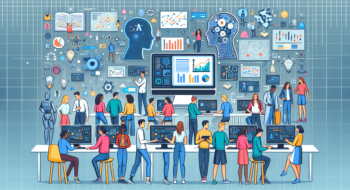In today’s fast-paced business environment, the integration of artificial intelligence (AI) into Human Resource Management (HRM) is transforming the way organizations operate. By leveraging HR analytics, companies can gain data-driven insights that enhance their talent management strategies. AI applications facilitate more accurate employee turnover prediction, allowing HR professionals to proactively address retention challenges. This innovative approach not only streamlines recruitment processes but also improves overall employee engagement and productivity, leading to a more dynamic and effective workplace. As AI continues to evolve, its role in HRM will only become more critical, reshaping the future of human resources.
The Role of AI in Human Resource Management
AI has become an indispensable tool in modern HRM, revolutionizing various aspects of the field. Here are some key ways AI is impacting HR:
Streamlining Recruitment and Selection
AI-driven solutions are significantly enhancing the recruitment and selection process. These systems can quickly identify potential candidates who match the required skills and experience for a job. By analyzing candidate data using advanced algorithms and machine learning, AI can identify top candidates faster and more accurately than traditional recruiters. For instance, AI can analyze language, tone of voice, and facial expressions to provide insights into a candidate’s workplace behavior and personality, which might not be apparent from a CV alone.
Automated Onboarding and Offboarding
AI is also transforming the onboarding and offboarding processes. AI-driven onboarding platforms guide new hires through necessary forms, company policies, and initial training sessions, reducing stress and making the transition smoother. Similarly, AI can manage offboarding tasks such as exit surveys, return of company property, and revoking access to company systems, ensuring a seamless transition for both the employee and the organization.
Performance Management and Career Planning
AI tools are being used to track and analyze employee data throughout the year, providing comprehensive reports on individual strengths, areas for improvement, and progress over time. This helps in conducting fairer performance reviews and identifying opportunities for growth. AI can also predict which employees may need new challenges or have outgrown their current roles, enabling managers to introduce new learning and development programs.
Employee Engagement Initiatives
HR teams often struggle to gauge employee sentiment accurately. AI-powered survey tools can automate this process, soliciting honest and anonymous feedback from employees. These tools analyze the feedback to identify trends and areas of concern, providing HR teams with valuable insights to improve employee satisfaction and engagement.
Workforce Planning
AI analytics platforms can crunch vast amounts of employee data to uncover trends, predict turnover, and highlight potential skills gaps. This enables HR professionals to develop targeted training programs and solid succession plans, ensuring the workforce is ready to meet future business needs.
Applications of AI in HR Analytics
HR Chatbots and Virtual Assistants
Chatbots and virtual assistants are common AI tools in HR, responding 24/7 to employee queries about leave policies, benefits, and other frequently asked questions. These tools improve the overall employee experience while saving HR teams time and effort.
Document Scanning and Management
AI-powered Optical Character Recognition (OCR) eliminates the need for manual labor in scanning employee and HR documents. This technology streamlines processes such as expense management, verifying candidate and new employee ID proofs, and other document-related tasks.
Facial Recognition and Attendance Management
In some organizations, AI-driven facial recognition technology is integrated into attendance management systems. This technology, combined with geo-tagging and geo-fencing, ensures accurate attendance logging from various locations while upholding security and compliance measures.
Predictive Analytics
AI integrated into HR analytics can uncover hidden patterns within organizational data using predictive analytics engines. These engines analyze employee behavior and other variables, guiding appropriate actions throughout the employee lifecycle. For example, AI can autonomously prompt employees and managers to initiate corrective measures based on predictive insights.
The Future of AI in Human Resource Management
As AI technology continues to evolve, it is expected to create significant economic activity and transform HR practices further. By 2030, AI is predicted to generate $13 trillion in economic activity globally, with a focus on reducing behavioral and perceptual biases in human interactions.
Automation, Personalization, and Data-Driven Decision-Making
Future AI tools in HR will focus on more automation, personalization, and data-driven decision-making. AI will continue to improve processes such as job posting, candidate screening, and employee performance management by delivering real-time data and insights. This will enable HR professionals to make smarter decisions and drive strategic goals.
Generative AI and Its Impact
Generative AI, such as ChatGPT, is already being used in various HR functions, including recruitment, onboarding, and analyzing qualitative HR data. These tools are accelerating the talent search, eliminating repetitive tasks, and enhancing the overall HR workflow.
Challenges and Considerations
While AI offers numerous benefits, it also presents challenges such as evolving employee expectations, global labor shortages, and growing skills gaps. HR leaders must consider these challenges and ensure that AI adoption aligns with ethical, privacy, and regulatory standards. Integrating AI into HR requires a human-centric approach and a commitment to transparent and ethical AI practices.
For more detailed insights into how AI is transforming HR, you can explore resources such as Neyrotex.com, which offers comprehensive solutions and tools for leveraging AI in human resources.
Conclusion
The integration of AI in HRM is not just a trend but a necessity for modern organizations aiming to stay competitive. By leveraging AI, companies can streamline processes, enhance employee engagement, and make data-driven decisions. As AI continues to advance, its role in HR will become even more pivotal, driving innovation and efficiency in human resource management.
For further reading on the applications and benefits of AI in HR, you can refer to resources such as Retorio’s blog on AI in HRM and Workable’s tutorial on AI in HR.
To stay ahead in the evolving landscape of HR, it’s crucial to adopt AI solutions that align with your organization’s strategic goals. Explore how Neyrotex.com can help you integrate AI into your HR practices effectively.







